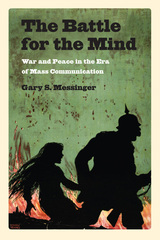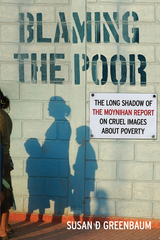123 books about Social Psychology and 4
start with B
123 books about Social Psychology and 4
123 books about Social Psychology
4 start with B start with B
4 start with B start with B

The Battle for the Mind
War and Peace in the Era of Mass Communication
Gary S. Messinger
University of Massachusetts Press, 2011
Most people typically think of armed conflict in physical terms, involving guns and bombs, ships and planes, tanks and missiles. But today, because of mass communication, war and the effort to prevent it are increasingly dependent on non-physical factors--the capacity to persuade combatants and citizens to engage in violence or avoid it, and the packaging of the information on which decision making is based. This book explores the many ways that mass communication has revolutionized international relations, whether the aim is to make war effectively or to prevent it.
Gary Messinger shows that over the last 150 years a succession of breakthroughs in the realm of media has reshaped the making of war and peace. Along with mass newspapers, magazines, books, motion pictures, radio, television, computer software, and telecommunication satellites comes an array of strategies for exploiting these media to control popular beliefs and emotions. Images of war now arrive in many forms and reach billions of people simultaneously. Political and military leaders must react to crowd impulses that sweep around the globe. Nation-states and nongovernmental groups, including terrorists, use mass communication to spread their portrayals of reality.
Drawing on a wide range of media products, from books and articles to films and television programs, as well as his own research in the field of propaganda studies, Messinger offers a fresh and comprehensive overview. He skillfully charts the path that has led us to our current situation and suggests where we might go next.
Gary Messinger shows that over the last 150 years a succession of breakthroughs in the realm of media has reshaped the making of war and peace. Along with mass newspapers, magazines, books, motion pictures, radio, television, computer software, and telecommunication satellites comes an array of strategies for exploiting these media to control popular beliefs and emotions. Images of war now arrive in many forms and reach billions of people simultaneously. Political and military leaders must react to crowd impulses that sweep around the globe. Nation-states and nongovernmental groups, including terrorists, use mass communication to spread their portrayals of reality.
Drawing on a wide range of media products, from books and articles to films and television programs, as well as his own research in the field of propaganda studies, Messinger offers a fresh and comprehensive overview. He skillfully charts the path that has led us to our current situation and suggests where we might go next.
[more]

The Biological Foundations of Organizational Behavior
Edited by Stephen M. Colarelli and Richard D. Arvey
University of Chicago Press, 2014
In recent years, evolutionary psychology and behavioral genetics have emerged as prominent theoretical perspectives within the social sciences. Yet despite broad levels of commonality between the disciplines—including an emphasis on adaptation, evolved mechanisms that guide behavior, and consequences of mismatch between these mechanisms and novel environments—studies that apply these perspectives on social behavior to organizations remain relatively rare.
The Biological Foundations of Organizational Behavior brings together contributors who shed light on the potential that behavioral genetics and evolutionary psychology offer for studies of organizational behavior. In addition to examining the extant literature integrating these disciplines and organizational behavior, the book reconsiders a wide range of topics through the lens of biology within organizational behavior, including decision making, leadership and hierarchy, goals and collective action, and individual difference. Contributions also explore new areas of potential application and provide a critical assessment of the challenges that lie ahead. With accessible insights for scholars and practitioners, The Biological Foundations of Organizational Behavior marks a promising step forward in what is increasingly perceived to be an underdeveloped area of organizational behavior.
The Biological Foundations of Organizational Behavior brings together contributors who shed light on the potential that behavioral genetics and evolutionary psychology offer for studies of organizational behavior. In addition to examining the extant literature integrating these disciplines and organizational behavior, the book reconsiders a wide range of topics through the lens of biology within organizational behavior, including decision making, leadership and hierarchy, goals and collective action, and individual difference. Contributions also explore new areas of potential application and provide a critical assessment of the challenges that lie ahead. With accessible insights for scholars and practitioners, The Biological Foundations of Organizational Behavior marks a promising step forward in what is increasingly perceived to be an underdeveloped area of organizational behavior.
[more]

Blaming the Poor
The Long Shadow of the Moynihan Report on Cruel Images about Poverty
Greenbaum, Susan D
Rutgers University Press, 2015
In 1965, the late Senator Daniel Patrick Moynihan—then a high-ranking official in the Department of Labor—sparked a firestorm when he released his report “The Negro Family,” which came to be regarded by both supporters and detractors as an indictment of African American culture. Blaming the Poor examines the regrettably durable impact of the Moynihan Report for race relations and social policy in America, challenging the humiliating image the report cast on poor black families and its misleading explanation of the causes of poverty.
A leading authority on poverty and racism in the United States, Susan D. Greenbaum dismantles Moynihan’s main thesis—that the so called matriarchal structure of the African American family “feminized” black men, making them inadequate workers and absent fathers, and resulting in what he called a tangle of pathology that led to a host of ills, from teen pregnancy to adult crime. Drawing on extensive scholarship, Greenbaum highlights the flaws in Moynihan’s analysis. She reveals how his questionable ideas have been used to redirect blame for substandard schools, low wages, and the scarcity of jobs away from the societal forces that cause these problems, while simultaneously reinforcing stereotypes about African Americans. Greenbaum also critiques current policy issues that are directly affected by the tangle of pathology mindset—the demonization and destruction of public housing; the criminalization of black youth; and the continued humiliation of the poor by entrepreneurs who become rich consulting to teachers, non-profits, and social service personnel.
A half century later, Moynihan’s thesis remains for many a convenient justification for punitive measures and stingy indifference to the poor. Blaming the Poor debunks this infamous thesis, proposing instead more productive and humane policies to address the enormous problems facing us today.
[more]

Blush
Faces of Shame
Elspeth Probyn
University of Minnesota Press, 2005
With the rise of pride - national pride, gay pride, black pride, fat pride - shame, the "sickness of the soul," has acquired a bad reputation. While the repudiation of some forms and consequences of societal shame are undoubtedly necessary, Elspeth Probyn contends that this emotion is a powerful resource in rethinking who we are and who we want to be. When we blush, we are driven to question what we value about ourselves and why. Blush argues that we are all born with a capacity for shame, much as we are born with the capacity for anger or pride, and that shame, like these other emotions, can be good for us and reveal the good in us. Painfully introspective, shame demands that we question our actions and our relationship to others. Shame's physical manifestation - the blush - gives us away, connecting us to our humanity. What shames us says a great deal about our character as individuals and as a society, about our past and our desires for the future. Written in an engaging and personal style, Blush combines psychology and cultural criticism, sociology and popular science, to present a unique perspective on debates about the ethics and emotion of identity.
[more]
READERS
Browse our collection.
PUBLISHERS
See BiblioVault's publisher services.
STUDENT SERVICES
Files for college accessibility offices.
UChicago Accessibility Resources
home | accessibility | search | about | contact us
BiblioVault ® 2001 - 2024
The University of Chicago Press









